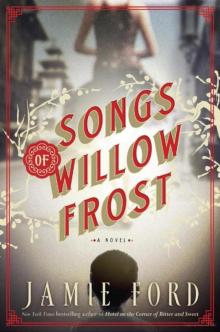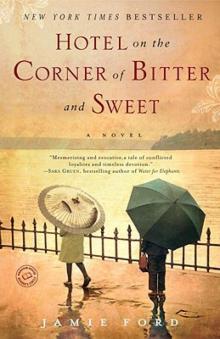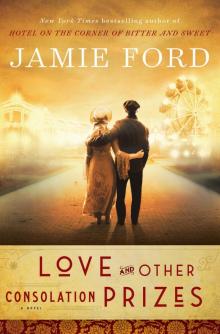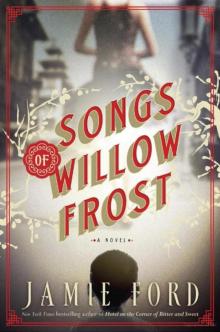- Home
- Jamie Ford
Songs of Willow Frost: A Novel Page 4
Songs of Willow Frost: A Novel Read online
Page 4
AFTER BREAKFAST HE grabbed his books and hurried upstairs to his classroom, where thirty-five children crowded into neat rows, boys on the left, girls on the right, two to each desk—all but Marco, who seemed to relish having his own space, even if it was a wheelchair in a corner at the front of the room.
William wedged himself into a wooden seat in the back, next to Dante, who was twice his size but clumsy and loping like a big dog that didn’t know how enormous he really was. “Sorry about the other night,” William whispered. “You can punch me in the arm if you wanna get even.”
“No need.” Dante shook his head. “A night in the cloakroom is punishment enough. Too much if you ask me.”
Dante had grown tired of the sisters calling him Danny. “Too Irish,” he’d said, and now he wanted to be called Sawyer, in homage to his late lumberjack father. For a big son of a lumberjack, Sawyer cried an awful lot.
Instead of listening to Sister Seeley go on about arithmetic, William stared out the window, watching autumn settle upon Sacred Heart like a blanket of wet magnolia leaves. He calculated how he and Charlotte could get away to the 5th Avenue Theatre, the Pantages, or the Palace Hippodrome—wherever Willow would soon be appearing. He’d never been inside any of those venues but had always marveled at the posters on the street; even the old ones that were faded and peeling still thrilled him with images of ice-skating couples, animal acts, magicians with spangled waistcoats, and child performers like Dainty June Hovick—the Darling of Vaudeville. Admission is usually twenty-five cents, William thought. But Willow’s show might cost a bit more. He had a whole dollar in coins, hidden beneath a rock in the grotto, but with four-penny flophouses now advertised as two bits a night, plus trolley fare and transfer on top of that, they wouldn’t last a week in the city. And winter is just around the corner.
“You’re still thinking about that show, aren’t you?” Sunny whispered from his desk across the aisle. William shook his head. “You get caught, they’ll kick you out for sure. They’ll sell you to a poor farm that’ll make this place look like Heaven on Earth.”
Heaven, William realized, some kids actually love this place. Which only made him wonder how bad their lives must have been on the outside. But as a Chinese boy who always struggled to fit in, he knew he didn’t belong here. From the way the other kids looked at him and called him chink to their mortified reactions when he told them his favorite snack was barbecued chicken feet. Tommy Yuen had known it too. This was not their kind of paradise. Though Sunny is right. Just last month they’d learned that the board of trustees had voted to expel all the colored kids—sending them to the King County Poor Farm, down by the rills of the Duwamish River. There they’d be indentured workers until they turned twenty-one, without the possibility of placement or adoption.
William feared the poor farm even though he’d only seen it through the nickelodeon of his imagination, cranked to high speed by the stories Sister Briganti shared. “The poor farm isn’t a place of charity, it’s a den of iniquity. When you’re sent there they publish your name in the newspaper for all the world to see,” she’d said. “When you recite your bedtime prayers, give thanks that you’re not bunking next to grown men—drunkards, layabouts, and stew bums—the lot of them cursing, fighting, and causing trouble. Or some rapacious old beaucatcher, probably touched in the head. They’ll steal your shoes while you sleep, just to make a pot of soup with the leather.”
William blinked as Sister Seeley caught him daydreaming.
“Willie,” she said. “Why don’t you come to the board and solve this equation for us?” She held out a piece of chalk and cocked her other hand on her hip.
William walked to the front of the classroom and stared numbly at the blackboard, still thinking of how he could possibly manage outside, with or without Charlotte. Was it worth the risk? As he felt the piece of chalk in his hand, he missed the way his mother had helped him with his schoolwork when he was in the second grade. She’d been so cheerful, so content, and so incredibly proud. He vaguely remembered echoing those feelings. He wondered if he would even recognize that kind of love and adoration anymore. Everything was muddled now. He regarded the chalkboard. Somehow life had become a story problem, and William was terrible at math.
“WE SHOULD DO it—we should run away,” Charlotte whispered to William at lunchtime, half-daring, half-pleading. “We could team up.” She spoke with such enthusiasm, such ridiculous, impractical confidence—the way a little kid would see Mount Rainier peeking through the clouds eighty miles away and blurt, “We should climb it.”
William wasn’t so convinced. At Sacred Heart he could never get enough time with friends, but out in the real world, he’d be her eyes, her caregiver—her protector. She was his best friend, but he wasn’t sure if he could handle that much responsibility. I don’t know how I’d provide for myself, he worried. He wished he had someone to call on, but most of his ah-ma’s relatives had died from the Spanish flu, and the only cousins whose names he could remember had left years ago.
William asked, “Do you have anyone that could help us?” He watched as she felt the edge of her plate and turned it clockwise, eating and wiping her chin with a napkin.
“I have some relatives,” she said. “But I’m the white sheep of my family.”
He didn’t quite understand as he regarded Charlotte’s fair skin and ginger hair.
“I’m the only normal one. My father and all his brothers are behind bars on McNeil Island.” She smiled as she spoke, tucking her spoon into a heap of crab-apple pudding. William wasn’t sure if she was happy that her father was imprisoned or happy with her dessert. “And my grandma has her hands full taking care of my grandpa, who lost his wits in the Spanish war. I don’t know if she’d help us. I know she’d feed us, but she’d probably turn around and bring us right back here.”
Sister Briganti constantly reminded them that there were starving children out there, despite the fact that those kids still had able-bodied parents—times were that bad for everyone. William looked down at his sandwich and frowned. Tomato. He’d eaten tomato sandwiches every day since August. Soon, they’d switch to zucchini for the winter months, which only made him long for tomatoes again. Lunch seemed like a wide, colorful variety compared to breakfast, which was always oatmeal. He hated the warm mush because he was next to last in line and had to pick out the weevils that settled at the bottom. Sunny, who was dead last, refused his porridge one morning. He told the sisters he wasn’t hungry and stared back defiantly. That got him a whipping for being obdurate and a double helping the next day. He ate it without bothering to pick out the bugs, then threw up all over one of the sisters. William didn’t bother to ask if Sunny did it on purpose.
William shook his head. “I don’t know—I don’t like it here any more than the rest, but it sounds awfully tough out there.” And who knows what might happen if we got caught? Sister Briganti would probably make us say the Hail Mary a thousand times and then still send us to the poorhouse.
“Well, I’m leaving, William—with or without you. And I’m not coming back,” she said and then paused as though waiting for his reaction. “Ever.”
William took a bite and chewed the stale bread. “But … how will you live? What’re you going to do, steal lead from chimneys? Sell fruit on the street?” A girl in her condition, leaving, running away—it seemed like such foolishness. But even as he said those words of doubt, he felt an overwhelming admiration—for her courage, her blind ambition. She wasn’t about to settle for making brooms or sewing buttons on coats for the rest of her life. Surely if a sightless girl wasn’t afraid …
“We’ll find something,” she said, staring at nothing, yet smiling at everything.
Or someone, William thought. If Willow is my ah-ma, she has to take me back, doesn’t she? She probably figured that another family had adopted him—case closed, William reasoned. Why else would she leave me here? When she realizes I’m her long-lost son, we’ll send Mother Angelini a picture postcard
of the two of us in front of the Hollywoodland sign. William pictured the prioress dropping dead of a thrombosis right there in her office. But he also imagined something darker. He struggled to contain his fears, his doubts that were just below the thin icy surface of hope—lurking beneath was the possibility of finding out that she really didn’t want him at all.
Before Charlotte could press her argument, a wave of silence rippled through the lunchroom as Sister Briganti appeared, ruler in hand. She glided past, saying, “Porci pinguescunt porcis adepto mactatos,” in a cheery, singsong voice. The Latin aphorism meant Pigs get fat, hogs get slaughtered, and was supposed to be about working hard and avoiding sloth, but she said it only in the cafeteria, much to her own amusement, an inside joke between her and the Holy Ghost.
“I have a most special surprise for you after lunch,” she said. “So eat up, little piglets. Don’t dillydally. Don’t lollygag. Don’t miss out.”
As children whispered and scraped their plates, William heard a truck rumbling up to the porte cochere in front of the school. A horn honked as though on cue.
“Probably a slaughterhouse on wheels,” Sunny remarked as he walked by. “I saw one of those back home on the reservation. They march pigs up a ramp and then a giant blade chops their heads off.”
A girl at the next table overheard Sunny and said, “Ewwww …”
Because of Sunny’s deadpan voice, William was never sure when he was joking. And when he playfully punched William in the arm, Sunny still didn’t smile.
“When you clean your plate you may come outside,” Sister Briganti announced with a snap of her fingers; tucking the ruler up her sleeve, she glided out the door. William hurried to finish his sandwich and gulped it down with a tin cup of warm powdered milk. He stood up and felt a hand on his shoulder as Charlotte found the crook of his arm and let him lead her out the front door and down the stairs with the rest of the herd. In their excitement they didn’t even stop to get their coats or hats.
Idling in the courtyard was an enormous truck with the words KING COUNTY painted on the door. The rear of the truck was enclosed like a bus but windowless, though there were shuttered panels on each side. William watched as a mysterious ramp extended from the back to the mossy grass, like the gangplank of a steamship.
He explained what he was seeing to Charlotte, and she nodded along and fidgeted with her cane. Then he felt someone tap his other arm.
“I told you so,” Sunny said, making oinking noises and snorting like a pig.
William knew he was joking—he had to be, but the truck made him nervous nonetheless. He held out hope that it was a traveling act, like the puppet show put on by the Junior League or a brass ensemble.
Sister Briganti motioned to the driver, who turned the engine off.
Much to William’s surprise, a young woman with short brown hair stepped out of the cab, smiling and waving, peering at everyone over her spectacles. She peeled off her driving gloves and adjusted her hat.
“Since we can’t go to the library,” Sister Briganti said, “the library has agreed to come to us—they call it a bookmobile. This is Miss Fredericks.”
William didn’t quite understand until the librarian rolled up the shuttered panels to reveal hundreds of books. There were even folding step stools for the shorter kids. Some of the children clapped and squealed so loudly that they scared the birds from the trees overhead. Then Miss Fredericks climbed up the ramp and wheeled down a squeaking metal cart filled with picture books. One of the sisters rolled it toward the infants’ home as everyone lined up, standing on tippy-toes, peering over each other’s shoulders to get a better look. William forgot about his mother for a moment as he spied books by Defoe, Dickens, Hawthorne, and Longfellow, and countless other names he didn’t recognize. And there were entire shelves dedicated to Oliver Optic, Horatio Alger, and even the Hardy Boys. There were also pamphlets on modern evils. Sister Briganti thumbed through one called Orgies of the Hemp Eaters and another one about teetotalism. Until last year Prohibition had outlawed alcohol for as long as William could remember, which only confused him the first time he tasted wine during communion. God must have handpicked exceptions, he thought.
William’s excitement grew as the line shortened and smiling, delighted children began wandering off, books in hand, finding places to sit and read. William had been to the public library only once before, on a field trip, and even though he wasn’t allowed to check out anything, he never forgot how it felt to wander in and see books on shelves as high as the ceiling. The library is like a candy store where everything is free.
Sunny, Charlotte, and he took a step closer.
“Please pick something out for me, William,” Charlotte said as she tapped her cane. “I’d love for you to read it to me.”
William patted her arm. “I will, I promise,” he said. Then he felt someone grab the back of his shirt, almost popping off his back collar button.
Sister Briganti pulled Sunny and him aside. “Not until the kitchen is clean,” she said sternly, raising her eyebrows as she marched them back toward the cafeteria.
“Yes, ma’am,” they replied in unison. As they walked, William turned back and saw Charlotte looking dejected, leaning on her cane and staring in the direction of the bookmobile. The librarian smiled uncomfortably and politely ignored her.
At the orphanage everyone took turns sweeping floors, scrubbing toilets, washing dishes, and doing laundry. In all of the excitement, William had forgotten his assignment for the day—kitchen cleanup. As Sunny donned an apron and began washing the dishes, William hauled out the trash, each of them working faster than usual, afraid that the marvelous library on wheels would leave while they labored.
William dragged the garbage cans behind the main building, where he separated the refuse into large bins. One was for normal garbage. The other was filled with vegetable peels, apple cores, and other food scraps that local pig farmers would pick up and use for slop. He was so excited about the bookmobile that he began to think Sacred Heart wasn’t so bad. Maybe it’s safer if I just write to her, he reasoned. If she knows I’m here she’ll come for me. Dear Willow Frost …
Then William looked into one of the bins and saw a familiar face on a crinkled piece of paper—his photo of Willow, covered in eggshells and soiled coffee grounds. He fished it out with a stick, then wiped the image clean with his shirttail, doing his best to dry it off, smoothing out the wrinkles. He surmised that Sister Briganti didn’t approve of the glamorous photo and had crumpled it. She must have tossed it out with the morning garbage. William gently folded the damp picture and slipped it into his pocket. Then he snuck back into the dormitory and regarded the blank spot where his Popsicle frame had been. Alone he sat at the foot of his bunk, where he took out the picture, which still smelled of rotting fruit. He gazed at the strange, mysterious woman and whispered, “Why, Ah-ma?” as the ghost of his mother stared back.
Checking Out
(1934)
William spent most of that cold, drizzly Saturday afternoon stuck inside, atop a stepladder as he cleaned the third-floor windows. The tender skin on his fingers had wrinkled and pruned as he dipped sponges, again and again, into wooden buckets filled with vinegar and water. He gazed through the spotless glass as he wiped the surface dry with old newspapers. He admired the lofty view, staring through the fog toward Chinatown, trying to remember the smells of the Tai Tung Restaurant, the taste of sesame on oily chow fun noodles, and the sound of his mother’s voice. I have to leave, William resolved. He’d been driven to distraction by the thought of Willow coming to town and then vanishing before he ever had an opportunity to look into her eyes, searching for answers to his brokenhearted questions. As William regarded the panorama of mist and tall buildings, he noticed his own reflection—the shape of his face, his chin, which mirrored that of the mysterious woman he’d seen on-screen. He watched the light change in the polished glass as he tried to divine his future, a Gypsy peering into a crystal ball, seeking substance f
rom shadow. Then Sister Briganti walked by and barked at him for daydreaming, lollygagging, and for wiping his hands on his breeches, where he’d left inky fingerprints and streaks of yesterday.
William cleaned up and met Charlotte after dinner in the study lounge. She needed someone to read her history assignment for her, so William had volunteered, as he always did, even though he still struggled with the big words and complicated, Western-sounding names. As he read aloud, he looked about, knowing he was Charlotte’s only option for help because the other kids acted so queer around her. When others read to her, they’d increase the volume of their voices as if she were deaf, or phrase things in simple terms as if she were dim. Sitting next to Charlotte, William remembered all the times a new boy would arrive, how that boy would turn his head when he saw her strawberry-red hair, only to quickly lose interest when he noticed her cane and those wide, milky eyes, which never found what they were searching for.
“When do you want to do it?” Charlotte asked.
“Shouldn’t we keep working on history?”
“This place will be history once we leave.”
William hesitated, then shrugged, closing the book in his lap as he looked around to make sure no one was listening in. “Well, according to the newspaper, the Movietone Players begin their run next Friday at the 5th Avenue Theatre. I think we should look for the best opportunity, for the best weather, but the later in the week the better.”

 Songs of Willow Frost
Songs of Willow Frost Hotel on the Corner of Bitter and Sweet
Hotel on the Corner of Bitter and Sweet Love and Other Consolation Prizes
Love and Other Consolation Prizes Songs of Willow Frost: A Novel
Songs of Willow Frost: A Novel